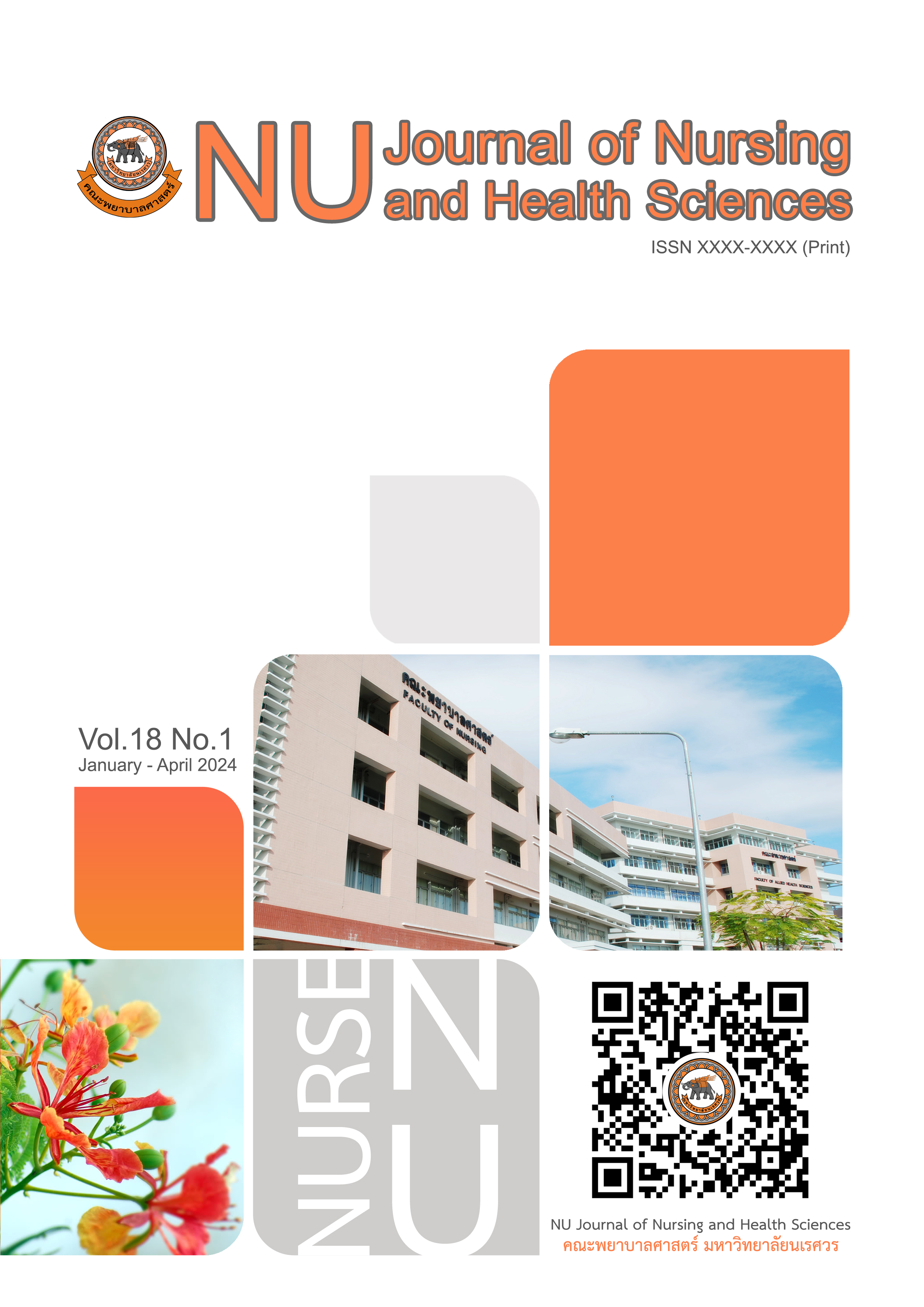The Effect of “Be Smart to Know-Use-Create Child Development Media Program (BeSKUC)” on Parents’ Digital Literacy Skill to Promote Preschool Child Development
Main Article Content
Abstract
This research is a quasi-experimental study aimed at evaluating the effectiveness of the ‘Be Smart to Know-Use-Create Child Development Media Program (BeSKUC)’ on parents’ digital literacy skills to promote preschool child development. The program is designed according to transformative learning theory. The sample group consisted of parents of preschool children aged 3-6 years attending Tha Thong Child Development Center from January to August 2022. The 38 subjects were randomly assigned to the experimental group, and 38 to the control group. The experimental group received a 3-week program. Data were collected using a digital literacy skills questionnaire that had been validated for content validity (CVI= .97) and reliability (Cronbach’s Alpha = .97). Data were analyzed using descriptive statistics, Chi-Square, Paired t-test, and Independent t-test.The results of the research found that the experimental group had a higher mean score difference in parents’ digital literacy skills than the control group with no statistical significance (p > .05). However, when analyzing and comparing scores of parents’ digital literacy skills in the experimental group and control group before and after participating in the program, it was found that the control group’s scores did not differ significantly (p > .05), while the experimental group’s scores after participating in the program were significantly higher than before participating in the program (p < .05). Parents attending all phases tended to develop skills in accessing, understanding, using, and creating digital media for preschool children. The findings then revealed the process of learning to advance digital literacy among the parents. Critical conversations about experiences in using digital media and critical reflection could help parents analyze and realize the advantages and disadvantages of the media. Parents were able to decide on appropriate digital media and create digital media to enhance child development.
Article Details

This work is licensed under a Creative Commons Attribution-NonCommercial-NoDerivatives 4.0 International License.
References
Anderson, D. R., & Subrahmanyam, K. (2017). Digital screen media and cognitive development. Pediatrics, 140(Suppl 2), S57-s61. https://doi.org/10.1542/peds.2016-1758C
Baramee, J. (2012). Statistics for health research and data analysis with SPSS program. Chonburi: Bangsaen printing.Cabello-Hutt, T., Cabello, P., & Claro, M. (2017). Online opportunities and risks for children and adolescents: The role of digital skills, age, gender and parental mediation in Brazil. New Media & Society, 20(7), 2411-2431. https://doi.org/10.1177/1461444817724168.
Center for Media Literacy. (n.d.). What is Media Literacy? A definition...and more. Retrieved from http://www.medialit.org/reading-room/what-media-literacy-definitionand-more
Cohen, J. (1977). Statistical power analysis for the behavioral sciences. New York: Academic Press.The National Health Service England (NHS England). (2017). A health and care digital capabilities framework. Retrieved from https://www.rcn.org.uk/-/media/Royal-College-Of-Nursing/Documents/Clinical-Topics/A-Health-and-Care-Digital-Capabilities-Framework.pdf
Fingar, K. R., & Jolls, T. (2014). Evaluation of a school-based violence prevention media literacy curriculum. Injury Prevention, 20(3), 183-190. doi:10.1136/injuryprev-2013-040815
Gerwin, R. L., Kaliebe, K., & Daigle, M. (2018). The interplay between digital media use and development. Child and Adolescent Psychiatric Clinics of North America, 27(2), 345-355. https://doi.org/10.1016/j.chc.2017.11.002
Hidayat, M. L. & Listiawati, V. (2018). The urgency of parents digital literacy to prevent their children from harmful effect of smart-mobile devices. 618-622. Retrieved from https://publikasiilmiah.ums.ac.id/handle/11617/10255
Hibbs, P. & Kulapichitr, U. (2017). Roles of parent mediation for promoting media literacy of preschoolers in child development centers in the Bankok Metropolis. Journal of Education Studies, 11(1), 18-29. Retrieved from https://so01.tci-thaijo.org/index.php/OJED/article/view/82490. [In Thai].
Jutrakul, S. (2018). Digital literacy, digital natives and family. Journal of Management Science Chiangrai Rajabhat University, 11(1), 132-151. Retrieved from https://so03.tci-thaijo.org/index.php/jmscrru/article/view/122738.[In Thai].
Livingstone, S. (2019). EU Kids Online. In The International Encyclopedia of Media Literacy (pp. 1-17). https://doi.org/https://doi.org/10.1002/9781118978238.ieml0065.
Mezirow, J. (2000). Learning as transformation. Critical perspectives on a theory in progress. Jossey-Bass.
Nurhayati, S., Noor, A., Musa, S., Jabar, R., & Wamaungo, J. (2022). A digital literacy workshop training model for child parenting in a fourth industrial era. HighTech and Innovation Journal, 3, 297-305. doi:10.28991/HIJ-2022-03-03-05.
Office of the National Digital Economy and Society Commission (ONDE). (2018). Digital competence framework for Thai citizens. Retrieved from https://web.parliament.go.th/assets/portals/1/files/digital_competence_framework_for_thai_citizens.pdf
Pantuworakul, K., & Nuansri, M. (2019). Young children as digital citizens: Opportunity or risk. Journal of Education Studies,47(Supplement), 1-23. Retrieved from https://digital.car.chula.ac.th/cgi/viewcontent.cgi?article=3813&context=educujournal. [In Thai].
Poltana, P., Leaudnakrob, N., & Yingyoud, P. (2019). Development of transformative learning model to enhance creative thinking ability and emotional intelligence. Journal of Health Science, 28(suppl), 42-52. Retrieved from file:///C:/Users/acer/Downloads/6790-Article%20Text-9453-1-10-20190528%20(1).pdf. [In Thai].
Rachel, B. (2019). Growing up in the digital age: Early learning and family media ecology. Current Directions in Psychological Science. 28 (4):096372141983824. https://doi.org/10.1177/0963721419838245
Radesky, J. S., Peacock-Chambers, E., Zuckerman, B., & Silverstein, M. (2016). Use of mobile technology to calm upset children: Associations with social-emotional development. JAMA Pediatrics, 170(4), 397-399.https://doi.org/10.1001/jamapediatrics.2015.4260
Reedy, K., & Parker, J. (2018). Digital literacy unpacked (K. Reedy & J. Parker, Eds.). Facet. https://doi.org/10.29085/9781783301997
Robinson, T. N., Banda, J. A., Hale, L., Lu, A. S., Fleming-Milici, F., Calvert, S. L., & Wartella, E. (2017). Screen media exposure and obesity in children and adolescents. Pediatrics, 140(Suppl 2), S97–S101. https://doi.org/10.1542/peds.2016-1758K.
Romero, M. (2014). Digital literacy for parents of the 21st century children. Elearning Papers, 32-40. Retrieved from https://www.researchgate.net/publication/262688255_Romero_M_2014_Digital_literacy_for_parents_of_the_21st_century_children_Elearning_Papers_38_32-40#fullTextFileContent
Srisawatlek, P., & kleebpung, N. (2019). The study of the media usage behavior, level of knowledge about media, and level of media literacy of the parents of primary school. Suan Dusit Graduate School Acardamic Journal, 16(3), 159-175. Retrieved from http://www.graduate.dusit.ac.th/journal/index.php/sdujournal/article/view/867/725.[In Thai].
Thantivetapikul, W. (2019). Developmental of non- formal education program for families to enhance media literacy skills. Chulalongkorn University Theses and Dissertations (Chula ETD). 9114. Retrieved from https://digital.car.chula.ac.th/chulaetd/9114. [In Thai].
Terras, M. M., & Ramsay, J. (2016). Family digital literacy practices and children's mobile phone use. Frontiers in Psychology, 7, 1957. https://doi.org/10.3389/fpsyg.2016.01957
Tipmanosing, D. (2022). Factors affecting early childhood development of children at the Bangkok Child Development Centers. Journal of Charoenkrung Pracharak Hospital, 18(1), 51-68. Retrieved from https://he02.tci-thaijo.org/index.php/JCP/article/view/256690 [In Thai].
Top, N. (2016). Socio-Demographic differences in parental monitoring of children in late childhood and
adolescents’ screen-based media use. Journal of Broadcasting & Electronic Media, 60(2), 195-212. https://doi.org/10.1080/08838151.2016.116416


